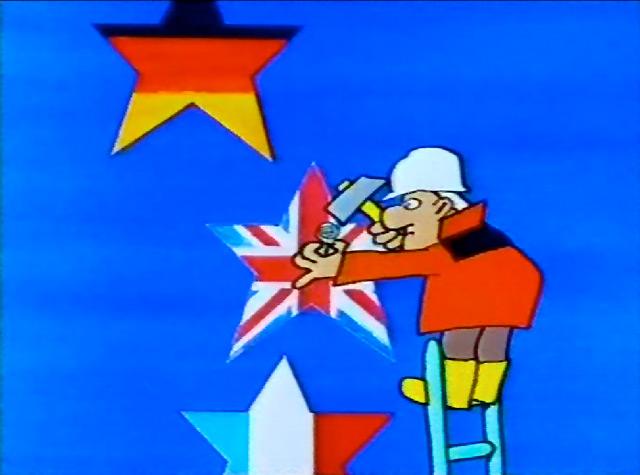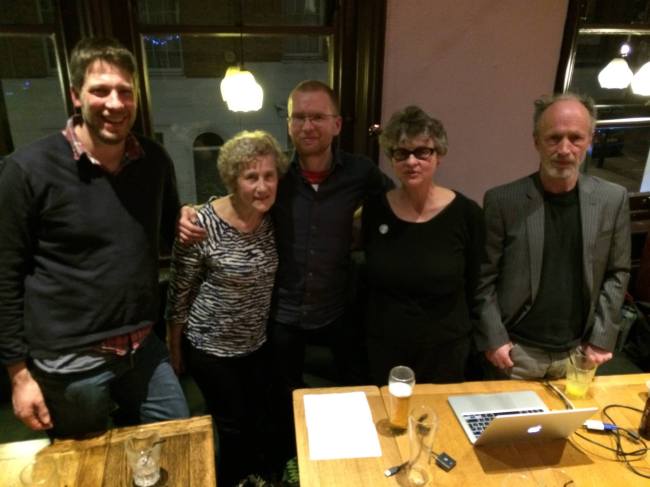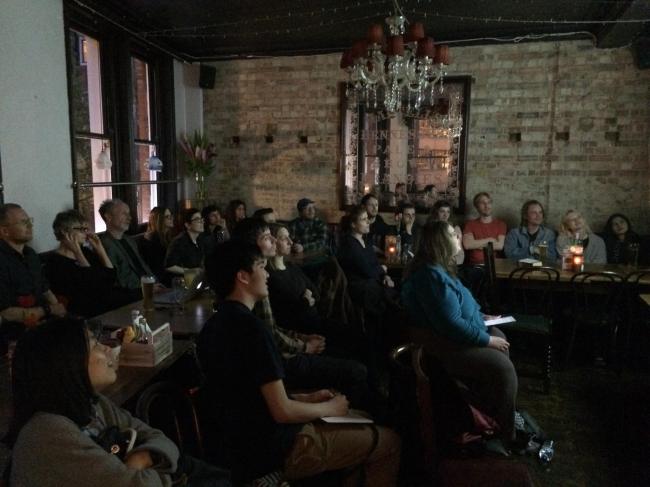Previous Event Subsequent Event
Know Your Europeans – Redux, 4th April 2017
Know Your Europeans – UK section by Bob Godfrey
Know Your Europeans was John Halas’ last film project: a feature film that celebrated European Union composed of short films, each about a different European country and made by a different animation team. In the end only Bob Godfrey’s film Know Your Europeans – UK was ever released and only Bob’s film, Christoph Simon’s film for Germany and the film trailer were ever completed – although several of the others exist in one form or another. John’s daughter Vivien Halas introduced the event and Jez Stewart of the British Film Institute gave a talk about the project and screened all the available completed material. Olly Brown, who was an animator on the UK film and Emma Calder and Ged Haney, producer and animator respectively of the Germany film, were also on hand to talk about their contributions.
Olly Brown, Vivien Halas, Jez Stewart, Emma Calder and Ged Haney
Jez kindly gave me a copy of his notes for the talk:
* The earliest correspondence in the file suggests that the project was first conceived in May 1991
* Also the files is a 25 page essay/book proposal “How to be a European” – which has lots of illustrations. A mix of personal reminiscences and opinions on the various countries and comments on language and VAT in each country
* Aim was to make 13 films – one for each EEC nation and five minute introductory film called “A NEW EUROPE”
* AN VROMBAUT – BELGIUM
* JANNIK HASTRUP – DENMARK
* MICHEL OCELOT – FRANCE
* CHRISTOPHE SIMON – GERMANY
* JORDAN ANANIADIS – GREECE (only a still in the promo)
* AIDAN HICKEY – IRELAND (only a still in the promo)
* BRUNO BOZZETTO – ITALY
* BOB BALSER – SPAIN
* PETRA DOLLEMAN – THE NETHERLANDS (just name in promo)
* ALVARO FEIJO – PORTUGAL (only a still in the promo)
* BOB GODFREY – UK
* ROBI ENGLER – LUXEMBOURG (unnamed in the promo)
* The initial plan was for the series to be released in Autumn 1992, ahead of the midnight moment of Dec 31st 1992
* Animators were paid £1000 each for the storyboards
* The Luxembourg entry was late entry into the proceedings
* The initial storyboard for the German entry was very different – Das Deutsche Haus. It was one of two storyboards branded as “no good and should be reworked” along with the Dutch entry
* In July 1993 the budgets ranged from £27,907 for the Belgian entry and £50,000 for Italy. UK entry was budgeted at £30K, the German entry at £31.7K. Total budget was £556,887 – the only secured funds were 70,000 ECU (£54K) for the promo from CARTOON
* Bob Balser was the president of CARTOON – the European Media Organisation
* A deal was struck with Jim Howell of Park Entertainment (owner of Lawnmower Man) to raise the funds for the project – he was to become the Executive Producer. The contract stated that he was to raise £500,000 if he did so he would get 5% of the budget, world rights, and 5% of the profits. He got £500 up front. If they raised 80% of the funds then they got some rights in the project. The contract began in April 1993 and would be terminated after 6 months if the money was not forthcoming.
* For the 30 second entry into the promo each filmmaker was given £5000 – £3000 uprising front, £2000 on receipt of the cut neg
* There was a delay in paying the filmmakers because the money was coming in instalments from CARTOON, and was going first to Park Entertainment – leading to some disgruntlement
* The pilot was put together by Bob Godfrey Films and shown at MIP-TV in April 1993
* There was also a press launch event with the filmmakers at MOMI on the 3rd April 1993 (so 24 years ago yesterday)
* A mail-out package, presumably with the promo reel and other details was sent to over 80 potential funders, over 40 of which did not reply, and most those who did said No or Maybe. Pencil written as additions at the bottom of this list are the names “Berlusconi?” And “Murdoch?”
* On the 30th November Park Entertainments contract for finding funding ran out and was terminated.
* In Jan 1994 there was a proposal to co-ordinate the episodes into one-hour long problems – probably because it was seen as easier to raise funds for a block of content rather than short fillers on the advice of commissioners like Clare Kitson
* John decided to part fund the project himself in order to continue it, and four films were chosen for completion in the hope that these would spark interest in the others – the UK, the Irish, the German and the Portuguese. Contracts were signed in April 1994
* On the 9th May 1994 John suffered a stroke.
* Three films were completed – the UK, German and Irish entries. The Portuguese film was dropped, not even making it to the animatic stage as the storyboard was “not sufficiently developed”.
* Petra Dolleman secured funds for the Dutch entry, but it seems not to have been completed.
* “Two of the three films so far produced, present the intentions of the project as they were conceptualised. The German film by Christophe Simon and the English film by Bob Godfrey both present the wit and humour, as well as the quality animation that Europe has become increasingly acknowledged for. The Irish film was unsupervised and this is apparent in the final result”
* Plans to continue the project without John’s direct involvement dismissed the other storyboards as inadequate and suggested the need to bring in other animators if the idea was to be continued
The films Jez screened were:
1. Know Your Europeans – Promo
2. A fragment of Know Your Europeans – Netherlands, recently discovered by Jez Stewart online.
3. Know Your Europeans – Germany by Christoph Simon and recently transferred from a 35mm negative by the BFI.
4. Know Your Europeans – UK by Bob Godfrey, the only one of the films to be released.
Interval
We then filled out the evening with two other films by Bob Godfrey about European Countries
5. Revolution – La Belle France
6. Happy Christmas, Switzerland
We also screened a section of Halas & Batchelor’s Charley in New Town (1948), which reflects the post-War optimism of the foundation of welfare state…
and The Shoemaker And The Hatter (1950), which reflects an innocent and enthusiastic vision of a united Europe, in sharp contrast to the wretched vision of Brexit today.


